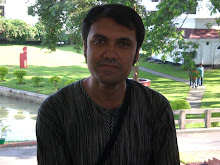
(I AM A WITNESS TO DAILY HAPPENINGS , DRAMAS, CHAOS....and a few positive CHANGES in Bangladesh).
Rights, media groups ask
By JULHAS ALAM
Associated Press Writer
Also Thursday, the government imposed an indefinite overnight curfew on
Elections were originally scheduled for Jan. 22, and Ahmed, in a televised address to the nation late Thursday, did not say when the elections would be held.
Under the country's constitution, the state of emergency suspends the fundamental rights of citizens, including those to hold rallies and protests.
The Ministry of Information on Thursday ordered eight private television stations to suspend their own news programs and to instead relay news bulletins of the state-run Bangladesh Television while the state of emergency was in place.
But the order said members of the media with appropriate credentials would be allowed to move freely.
"The restriction will be effective until further order from the ministry," Khairul Alam Mukul, a news editor at the private NTV television center told The Associated Press.
The New York-based Human Rights Watch appealed to the government to uphold the country's press freedoms.
"We consider freedom of the press an essential part of any democracy, especially in times of crisis," it said in a statement received by The Associated Press on Friday.
Separately the New York-based press freedom watchdog, the Committee to Protect Journalists, emphasized the need for access to information.
"It's essential that at this very sensitive moment Bangladeshi citizens have unfettered access to information," CPJ Executive Director Joel Simon said in a statement. "We call on authorities to withdraw their restrictions on the media, to respect the right of journalists to report fully and freely, and to ensure citizens' rights to independent information."
Bangladeshi journalists opposed the censorship order.
"We want to categorically state that gagging the media is not the answer to solving the present political crisis," said Mahfuz Anam, editor of
The imposition of the state of emergency was the latest twist in a tumultuous few months marked by increasing strife between rival political camps that has left at least 34 people dead since October and repeatedly paralyzed the South Asian country.
Prime Minister Khaleda Zia stepped down after completing her five-year term and handed over power to a caretaker government headed by Ahmed.
But Sheikh Hasina, the leader of a 19-party alliance, has been accusing the Election Commission and Ahmed of bias toward Zia, and has threatened to boycott and disrupt the election.

No comments:
Post a Comment